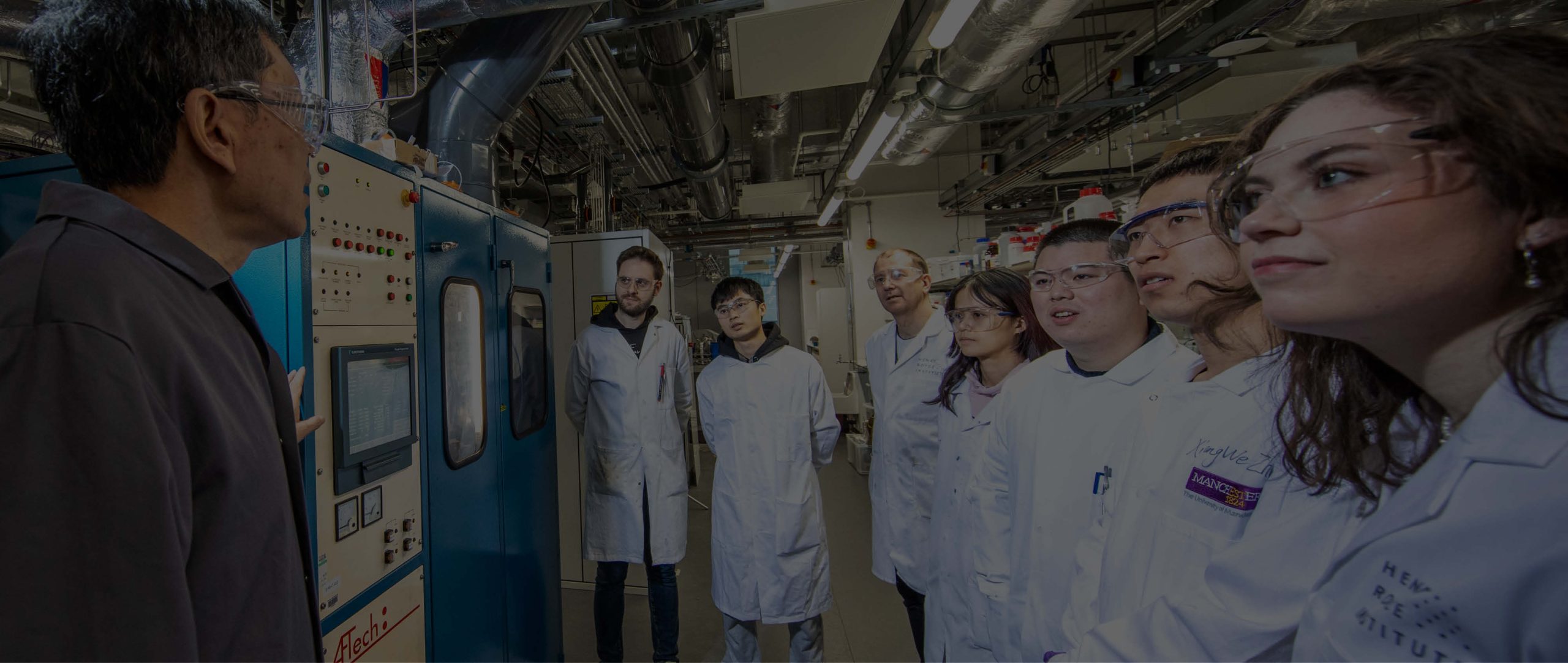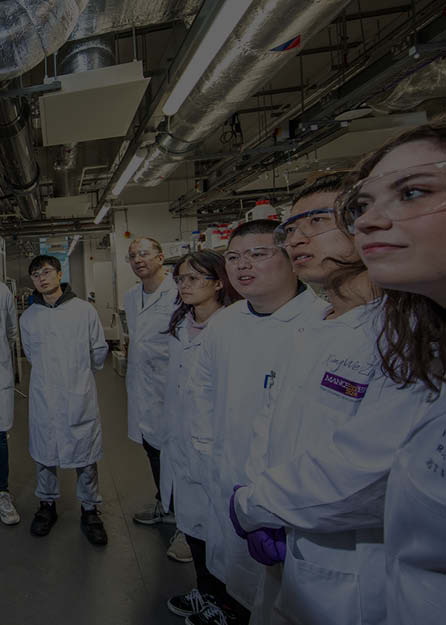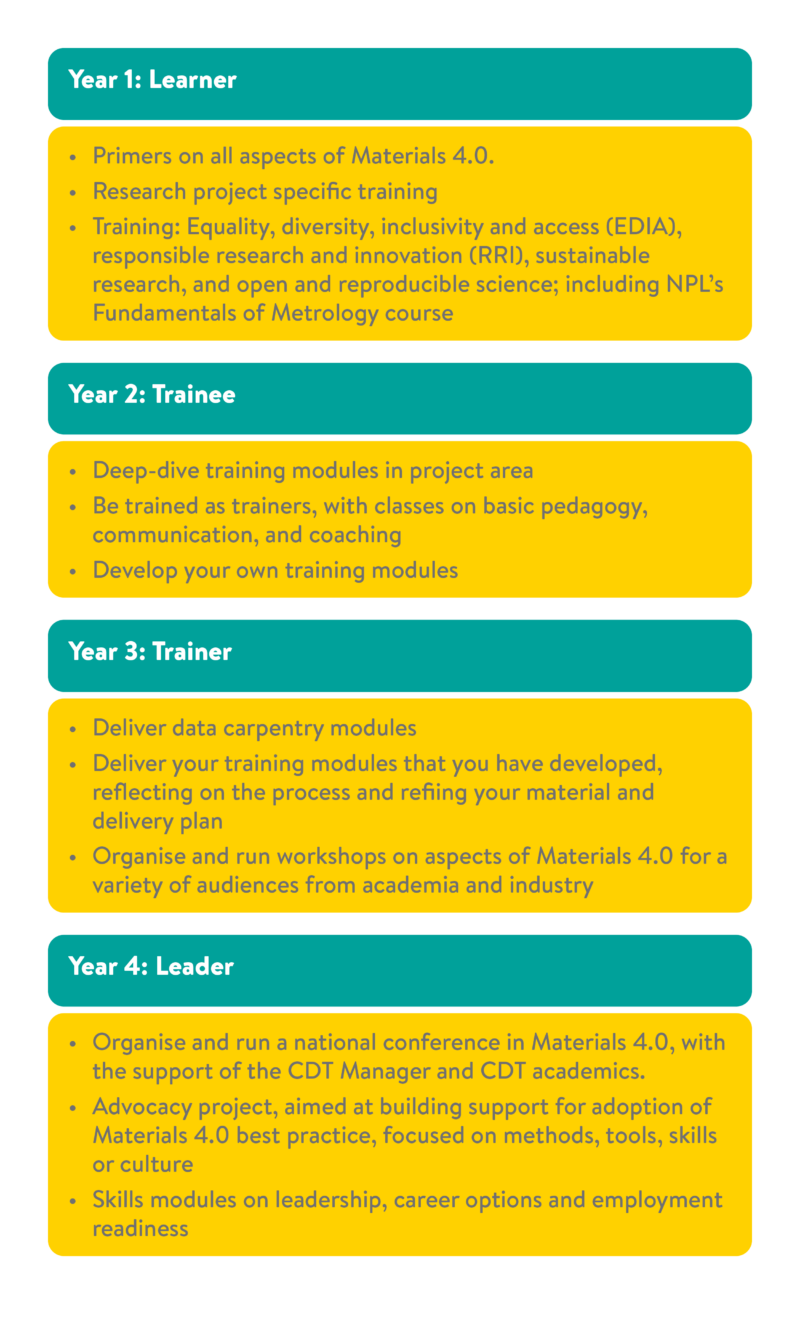

EPSRC Centre for Doctoral Training in Developing National Capability in Materials 4.0 with the Henry Royce Institute
Developing National Capability for Materials 4.0

Home / EPSRC Centre for Doctoral Training in Developing National Capability in Materials 4.0 with the Henry Royce Institute
Developing National Capability for Materials 4.0
Lead the digital revolution in materials science!
Partners
The CDT brings together the complementary strengths of two national institutes and seven research intensive universities.

A range of Partners means experience in teaching and training is provided in all aspects of Materials 4.0. The academic partners can draw on large numbers of undergraduate and postgraduate modules in key topics across materials science and each provides a range of training in technical and professional skills for Postgraduate Researchers (PGRs). NPL brings long experience of successfully running a national programme of PGR training through their Postgraduate Institute for Measurement Science.
As a PGR, you will benefit from an innovative approach to delivery. By becoming a Materials 4.0 PGR, you will be part of a broad cultural change in materials science, disseminating your new skills across research and into industry. The CDT will develop new leaders that make Materials 4.0 a ubiquitous approach to conducting materials science. It offers flexible and inclusive pathways for study, including options for part-time study and the opportunity to study whilst working and being sponsored by your employer.
Meet the team
The Royce Materials 4.0 CDT is led by two Co-Directors and the Management Board comprised of Co-Investigators from Royce Partners and NPL.
Directors
Dr Rob Lindsay, University of Manchester
Principal Investigator for the Centre
Reader in Corrosion Science and Engineering
Professor Chris Race, University of Sheffield
Co-Director and Co-Investigator
UKAEA Chair in Fusion Materials
Co-Investigators
Dr Kathy Christofidou, University of Sheffield
Senior Lecturer in Metallurgy & Royce Research Area Lead, Industry Liaison and Impact Lead
Professor Richard Bourne, University of Leeds
Professor of Digital Chemical Manufacturing, Academic Progression Committee Chair
Dr Enzo Liotti, University of Oxford
Departmental Lecturer in Processing of Advanced Materials, Responsible Research and Innovation & Environmental Sustainability Lead
Professor Rachel Oliver, University of Cambridge
Professor of Materials Science,Equality, Diversity and Inclusion Lead
Prof Salaheddin Rahimi, University of Strathclyde
AFRC Professor Of Practice, Entrepreneurship and Employability Lead.
Professor Aron Walsh, Imperial College London
Chair of Materials Design, Student Liaison and Wellbeing Lead
Dr Andrew Pollard, National Physical Laboratory
Science Area Leader for the Surface Technology Group, Training and CDT Network Liaison Lead
PGRs will be based at a Royce Partner University and conduct research in the group of their Academic Supervisor. Those working on industry projects will additionally have an Industry Supervisor.
Projects
Royce CDT research projects will create new ways of working across all sub-domains of materials science.
Each year, a range of projects covering all aspects of Materials 4.0 and spanning across the Royce Research Areas will be available in advance of each cohort recruitment phase.
Get in touch via doctoral-training@royce.ac.uk to find out more.


"We are building this training centre to address key challenges in materials science and drive the adoption of new ways of doing research. Training a new generation of scientists is one of the most rewarding aspects of my job, and seeing our CDT students go out into the world and apply the skills they learn in our centre will be a fantastic reward.”
Prof Chris Race | Co-Director, Materials 4.0 CDT
Course Structure
A new generation of researchers will be trained in the digitalisation of materials science, with students going on to work in UK academia and industry, applying knowledge and skills to shorten the time materials take to reach market. Bringing together high-throughput experimentation and modelling, big data and machine learning will transform materials science.
The core principle behind the training programme is to take PGRs ‘from learners to leaders’ over the course of their studies. The CDT will provide PGRs with the necessary skills and training to become a new type of scientist working in materials, but the ambition is to build an even broader skills base for UK academia and industry.
PGRs will begin by learning core skills and, as they develop proficiency and confidence, they will play an active role in training younger researchers, both within and external to the CDT, by developing training materials, new methods and tools to support their work in disseminating Materials 4.0.



Visit the Digital Materials CDT Website
Find out more about our activity and how you can partner with us to deliver new skills and expertise in Materials 4.0.
